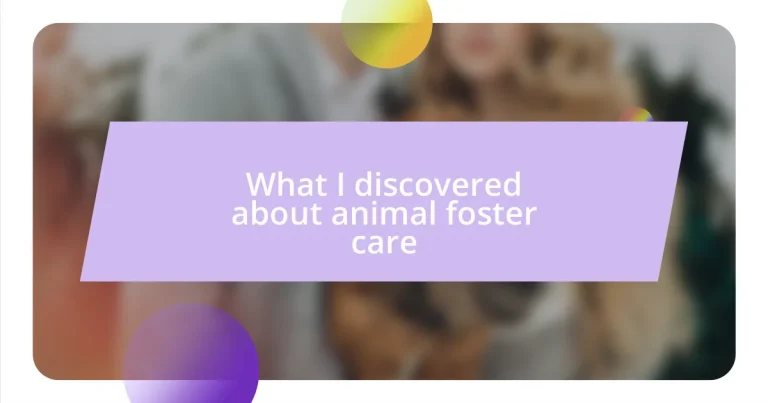Key takeaways:
- Fostering animals provides a safe environment that helps them transition from shelters to forever homes, enhancing their behavior and well-being.
- Engaging with foster animals fosters emotional connections but can also present challenges, such as fear, anxiety, and difficult behavioral issues.
- Support networks and resources, such as local shelters and online communities, play a crucial role in helping foster caregivers navigate their journey successfully.

Understanding animal foster care
Animal foster care is a vital bridge between the shelter environment and a forever home for animals in need. I still remember the first time I took in a foster dog; his nervousness was palpable, yet within days, I saw him transform into a happy pup, wagging his tail and exploring his new surroundings. Isn’t it amazing how a little space and love can bring out the best in these animals?
Fostering offers not just a safe haven for pets, but also a unique opportunity for individuals to experience the unconditional love that comes from helping an animal thrive. Each kitten I fostered revealed a distinct personality, turning my living room into a playful jungle filled with pouncing and purring. Have you ever considered how fostering could enrich your life while making a lasting impact on an animal’s journey to adoption?
In addition to saving lives, fostering animals provides critical insights into their needs and behaviors, informing potential adopters about what to expect. I often found myself documenting my foster pets’ quirks and preferences, which helped their future families understand them better—it felt like giving them a head start in their new life. What could be more rewarding than knowing you played a role in preparing them for their forever home?

Benefits of animal foster care
Fostering animals creates an incredible bond that often lasts long after the furry friend has found a permanent home. I recall fostering a timid tabby cat who would hide away for hours. After weeks of patience and gentle encouragement, she revealed her playful side; her purrs and soft nudges reassured me that my efforts were truly worth it. The happiness of seeing her find a loving family was one of the most fulfilling moments of my life.
Not only does fostering provide temporary shelter, but it also positively impacts the well-being of the animals involved. I witnessed firsthand how a loving environment reduced anxiety in my foster dog, who initially cowered at every sound. It’s fascinating how just a bit of time and care can drastically improve their quality of life, turning frightened creatures into confident companions ready for adoption.
Moreover, fostering supports local shelters by freeing up space and resources for more animals in need. I vividly remember the day I brought a litter of puppies home; the shelter staff breathed a sigh of relief knowing those playful pups had a space to grow and thrive. Can you imagine the collective impact we can have when each of us steps up to foster? It’s a win-win that not only heals animals but also strengthens our communities.
| Benefits of Animal Foster Care | Personal Experience |
|---|---|
| Creates Bonds | My tabby cat blossomed from a recluse to a playful companion. |
| Improves Well-Being | A scared dog was transformed into a confident pet in weeks. |
| Supports Shelters | Fostering a litter provided them space for other animals. |

Common challenges in foster care
Common challenges in foster care can sometimes feel overwhelming, but they are part of the journey. I’ve faced moments where a foster pet’s past trauma surfaced unexpectedly, leading to anxious behaviors that challenged my patience and understanding. It’s tough watching an animal struggle when all you want is for them to feel safe and loved.
Here’s a snapshot of some common hurdles I’ve encountered:
- Fear and Anxiety: Many animals come from stressful environments, so they may take time to trust you.
- Behavioral Issues: Adjustments can lead to challenges, like barking, scratching, or accidents in the house.
- Emotional Attachment: It’s easy to grow attached to these animals, which can make saying goodbye difficult.
- Inconsistent Support: Sometimes, local shelters lack the resources to provide guidance or assistance, leaving foster caregivers feeling isolated.
- Time Commitment: Fostering requires significant time, energy, and emotional investment, which can be challenging for busy individuals.
At times, I found myself navigating these challenges all alone, which made me appreciate the importance of seeking support from fellow foster parents. Sharing experiences and tips with others in the community really helped me feel less isolated and more empowered to continue fostering.

Best practices for successful fostering
Successful animal fostering requires dedication and a few key practices to ensure both the pet and the foster caregiver have a positive experience. I remember the first few days with my foster puppy, Max; he was so scared and disoriented. I found that establishing a consistent routine helped him feel more secure. Just like us, animals thrive when they know what to expect, and this simple change made a huge difference in his confidence.
Communication is crucial, not just with the pet but also with your support network. Whenever I needed advice or just someone to vent to about a rough day, tapping into the foster community made all the difference. Have you ever felt overwhelmed and just needed a friendly voice? Connecting with others who understand the struggles and joys of fostering can provide invaluable insights and support during tough times.
I also learned the importance of patience and adaptability. Each animal comes with their own unique history and needs. I once fostered a dog who reacted negatively to loud noises, and my heart ached for him. To help, I created a quiet retreat for him with blankets and his favorite toys. It was astounding how a little bit of understanding and a tailored approach brought out his playful side over time. What strategies have you considered trying to make your fostering experience smoother?

Resources for animal foster caregivers
Finding the right resources can truly make a world of difference in the fostering journey. I remember the first time I reached out to a local animal organization for guidance; the support they offered was incredibly reassuring. They provided everything from educational materials on pet behavior to access to a network of experienced foster caregivers. It’s amazing how a few well-placed resources can ease your worries and empower you to provide the best care possible.
Online forums and social media groups can also be lifesavers for foster caregivers. I stumbled upon a Facebook group specifically for foster parents, and it became a go-to for sharing my experiences and learning from others. Have you ever found a community that felt like home? The collective wisdom from fellow caregivers regarding everything from training tips to dealing with emotional challenges made my fostering journeys feel less daunting and more rewarding.
Don’t underestimate the power of local veterinarians and pet supply stores, either. They often have resources or can point you in the direction of essential services like low-cost spay/neuter programs or even food assistance. I recall one instance where my foster cat, Luna, needed a sudden vet visit. My local veterinary clinic not only offered a discount for foster animals but guided me about what to watch for in her recovery. Have you checked in with your community’s pet services? You might be surprised at the wealth of support just waiting to be discovered!

Success stories from foster caregivers
I can’t help but smile when I think about the success stories that have come out of animal foster care. One of my fondest memories is of nurturing a timid beagle named Daisy. She arrived at my home shy and withdrawn, but after weeks of gentle coaxing and playtime, she blossomed into a spirited companion. Watching her chase after her favorite toy for the first time reminded me of the joy that patience and love can bring—not just to the animal, but to us as caregivers, too.
Then there’s Oliver, a scruffy little terrier who had a rough start in life. The transformation I witnessed was truly remarkable. With consistent affection and the right environment, he went from being fearful of strangers to eagerly greeting every visitor with his wagging tail. Have you ever experienced that magical moment when an animal truly trusts you? That bond made all the effort worthwhile, proving that a little unconditional love can lead to unimaginable growth.
These success stories are more than just anecdotes; they’re powerful reminders of why many of us choose to foster. I’ve seen firsthand how fostering not only changes the lives of animals but also creates lasting connections for everyone involved. It’s a journey filled with emotional highs and lows, and the triumphs remind us that with time and care, every animal truly deserves a second chance.














